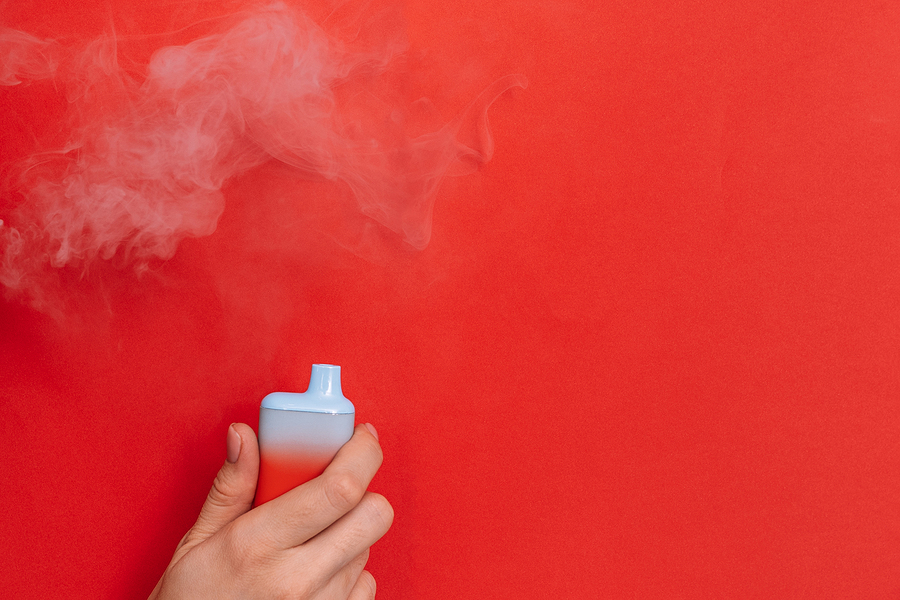Does Vaping Cause The Same Oral Health Problems As Cigarettes?
Posted by Dr. Thomas Flavin Jul 30,2021

Vaping, smoking e-cigarettes, and using other types of smokeless tobacco are increasing in popularity. In fact, the Centers for Disease Control and Prevention (CDC) has reported that e-cigarette use among high school students has skyrocketed from 1.5% in 2011 to 16.7% in 2018. Vaping is the act of inhaling and exhaling the aerosol, or vapor, produced by an e-cigarette or similar device. While many people choose to vape for enjoyment, some people vape as a method to quit smoking traditional cigarettes.
What is vaping?
Vaping is the inhalation of vapor produced from an electronic cigarette or similar device. Although vaping is marketed as a safer alternative to smoking cigarettes, it is unclear how safe it is. Research is limited on the effects of vaping on the gums and teeth. However, since vaping involves inhaling chemicals like nicotine, propylene glycol, and glycerol, it is not a healthy option for your dental health. Studies have linked smoking and tobacco use to a variety of oral health concerns, including gum disease, oral cancer, and tooth discoloration. These risks are even more concerning for users who vape as well. Since vaping does not produce smoke or tar, there is no filter to help remove these dangerous byproducts from your mouth. Instead, the chemicals go straight into your lungs, where they can damage your respiratory system. Users have reported dry mouth, sore throats, and lung irritations. Additionally, the acidity in e-cigarette liquid is also toxic to your teeth' enamel and can erode it over time. This increases your risk for tooth decay and cavities. This is why it is important to see your dentist regularly and practice good oral hygiene habits in addition to quitting smoking altogether.
What are the oral health problems caused by cigarettes?
Smoking cigarettes can lead to a wide range of dental health issues, including gum disease; bad breath; dry mouth; tooth discoloration and staining; chipped teeth; tooth loss; and even oral cancer. All of these problems are caused by the chemicals that are found in cigarettes and tobacco products. When inhaled, these chemicals can cause inflammation of the gum tissues, which can lead to gingivitis or periodontitis. As they irritate the gums, smokers are also at risk for developing serious gum recession, which can lead to severe tooth decay and tooth loss. In addition, regular smoking can really dry out the mouth, leading to uncomfortable feelings of dry mouth and chronic bad breath. You may find yourself reaching for more sugary beverages and foods in an effort to keep your mouth from being as dry as it usually is. Over time, this can increase your risk of cavities and other problems related to poor oral hygiene. Finally, the constant use of tobacco products can weaken the enamel on your teeth, increasing your risk of chipping and breaking a tooth. Tobacco use can also lead to a condition known as leukoplakia, which is a white plaque-like substance that is found on the soft tissues of the mouth. Leukoplakia can be an early indicator of oral cancer, but it is often easily treatable when caught early on.
How does vaping compare?
While e-cigarettes have certainly contributed to a reduction in cigarette smoking, that does not necessarily mean that vaping is any better for your teeth than smoking traditional cigarettes.
The chemicals in e-liquids are extremely similar to those in traditional cigarettes, and when smokers use both products together, it essentially doubles their exposure to these dangerous chemicals. Furthermore, many studies show that long-term users of nicotine-containing products are much more likely to have gum disease and other oral health issues.
If you are a current smoker, quitting is the best thing you can do to protect your oral health. If you’ve tried unsuccessfully to quit in the past, consider trying one of the forms of tobacco-free cessation aids that are out there, including prescription patches, gum, or medications. You can even get laser treatments for your gums to help heal the damage done by tobacco use.
If you are a smoker who is looking to quit using tobacco products altogether, remember that the best way to protect your oral health is to quit smoking entirely. Don’t try to “reduce” your risk by using e-cigarettes instead because that’s simply not true, and you’ll still be exposing your mouth to harmful toxins that way.
Regardless of whether you choose to vape or use smokeless tobacco options, always be sure to practice excellent oral hygiene habits by brushing twice a day for at least two minutes each time and flossing daily as well!
More Blog Posts
Save time by completing your new patient forms and sending them to us online or bring them with you to your first visit.
- MON - THU8:00 am - 5:00 pm
- FRI - SUNClosed







